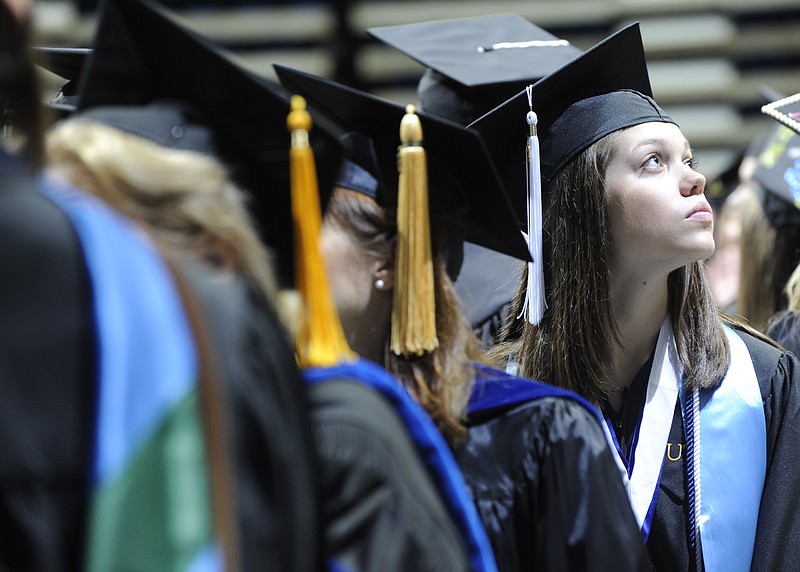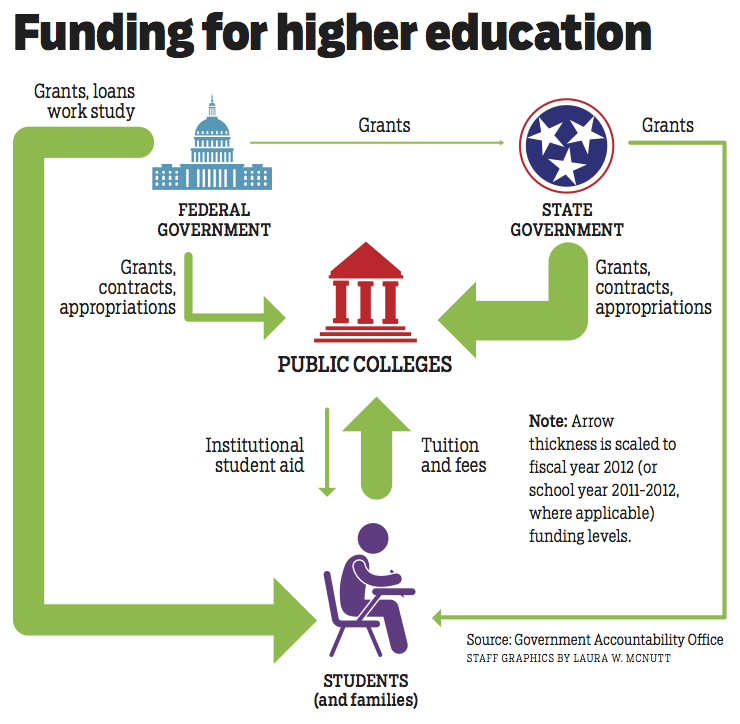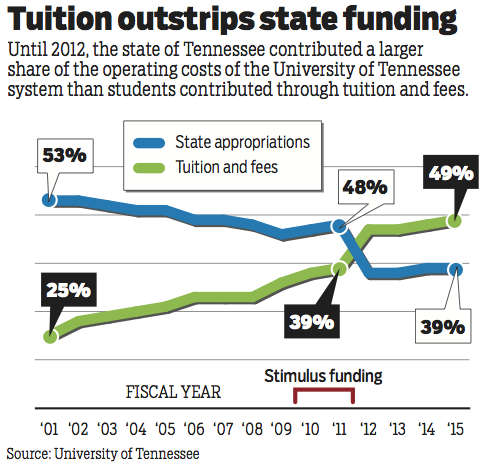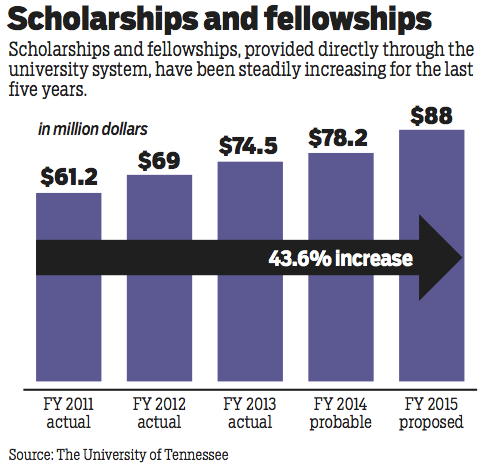In the 1970s, state governments provided almost 80 percent of public college funding, but those days are long gone.
For the past few years, students' tuition and fees -- not state governments -- have contributed the largest share of money to public college and university budgets, says a new study from the U.S. Government Accountability Office.
The trend is as true in Tennessee as anywhere. And for now, there's no end in sight.
"State funding is flat," wrote Charles M. Peccolo, the University of Tennessee's treasurer and chief financial officer, in his introduction to this year's budget.
UT President Joe DiPietro said that unlike for K-12 education, there is no state constitutional mandate to fund higher education -- even if lawmakers believe it's important.
"As a discretionary item in the state budget, higher education dollars are among those cut when funds are low," DiPietro wrote in a statement to the Times Free Press.
With state funding stagnant, the UT board of trustees increased tuition and fees by 6.7 percent this school year in the UT system, which includes campuses at Chattanooga, Knoxville and Martin. The Tennessee Board of Regents, which governs 46 institutions ranging from Chattanooga State Community College to Austin Peay State University, raised tuition and fees by 5.8 percent at 13 community colleges across the state, by 8.5 percent at 27 Tennessee colleges of applied technology, and from 0 to 6.9 percent at six universities.
For fiscal year 2015 in Tennessee, student tuition and fees make up 49 percent of the total revenue -- the highest portion students have paid since they first began contributing more than the state share in the 2011-12 academic year. The state, meanwhile, is funding 39 percent this year.
The federal study looked at costs at public universities in the United States between 2003 and 2012.
In 2003, states paid an average of 32 percent of their university system's revenue, and students paid 17 percent, the federal study said. But in 2012, states paid only 23 percent, while students contributed 25 percent of the revenue for public universities in the United States. Universities have other revenue sources as well, such as grants, contracts and selling certain services.
That's a stark contrast to 1974, when state appropriations nationwide were generous enough to fund 78 percent of the cost of college, according to "What's Happening to Public Higher Education?: The Shifting Financial Burden" a 2006 book edited by Ronald G. Ehrenberg.
UTC students react
Students at the University of Tennessee at Chattanooga weren't fazed by the news they're shouldering a larger share of the cost of college.
"That's not surprising," said Chris Moore, a junior who majors in computer engineering.
"College is expensive. That's just the way it is," said Moore. "You spend some money now to make money later."
UT remains competitively priced, its most recent budget says, and UT's three campuses are routinely cited as "best buys" in publications such as "The Princeton Review," the "Fiske Guide to Colleges," and "America's 100 Best College Buys."
"I think we're a really good deal, nationally, even though tuition's gone up and state funding's gone down," UTC Chancellor Steve Angle said.
In-state tuition at UTC is about $8,000 annually, or about $32,000 over four years. But Tennessee's lottery-funded Hope Scholarship, open to students who maintain a 3.0 grade-point average and meet other criteria, will cover $4,000 annually, or $16,000 over four years.
"That's pretty good," Angle said.
Statewide, the lottery funded about $303 million worth of scholarships in 2013-14. The UT system proposed to spend about $88 million on scholarships and fellowships for fiscal year 2015, which is up from $61 million spent in fiscal year 2011.
Anna Kaperak, a freshman psychology major from Franklin, Tenn., keeps out-of-pocket costs down with a Hope scholarship and a work-study scholarship, putting in nine hours a week working in the day care at UTC's Children's Center. Next year, she hopes to become a resident adviser in a dormitory, which would mean free room and board.
"We're trying to get me graduated debt-free," she said.
Asked if the state should contribute more, Kaperak said, "I don't know. It'd be helpful. College is expensive. Education is expensive. The whole world is getting more expensive."
TennCare crowds out higher ed
Tennessee Gov. Bill Haslam and other state leaders care about higher education, Angle said.
The governor recently called Angle out of the blue for an informal meeting so he could ask Angle how Tennessee is doing. Angle has been at UTC for less than two years and previously worked in Ohio, California and Wisconsin, so Haslam wanted to ask Angle how things work in other states.
"What can I do better for higher education in Tennessee?" Angle said Haslam asked him.
State Sen. Bo Watson, R-Hixson, gave a succinct explanation why the state of Tennessee now pays a smaller share of higher education than tuition covers.
"It's called health care," said Watson, who earns his living as a physical therapist. "As health care costs have gone up, it's crowded out other things that we'd like to do."
The state will increase its appropriation to the UT system by 1.6 percent above fiscal year 2014, Peccolo wrote in UT's budget. Most of the gain, $5.7 million, was to recognize exceptional performance, as measured by the state's new performance-based appropriations for college funding. The rest of the increase, $2.5 million, was to offset increased costs for group health insurance premiums.
TennCare, the state's Medicaid program, takes a bigger bite out of the state's budget every year -- rising by about $500 million over the past three years. In 2012-13 fiscal year, the state contributed $2.8 billion to TennCare, according to a chart on Page 339 of the state's 545-page budget. The proposed contribution for the 2014-15 fiscal year is $3.3 billion.
The state's constitutionally mandated requirement to fund kindergarten through 12th-grade education is another growing expense, Watson said. The state's contribution increased by $237 million over three years, the state budget says, from $3.9 billion in the 2012-13 fiscal year to $4.137 billion in the 2014-15 fiscal year.
Still, tuition at Tennessee schools is lower than in many other states, Watson said, and the Hope scholarship is a boon for Tennessee students who opt to pursue higher education in their home state.
"You can get an excellent education," said Watson, who graduated from UTC with a bachelor's degree in biology magna cum laude, the second-highest academic honor. "Tennessee students rank among the lowest of having any student debt."
Contact staff writer Tim Omarzu at tomarzu@timesfreepress.com or 423-757-6651.
Contact staff writer Mary Helen Miller at mhmiller@timesfreepress.com or 423-757-6324.



